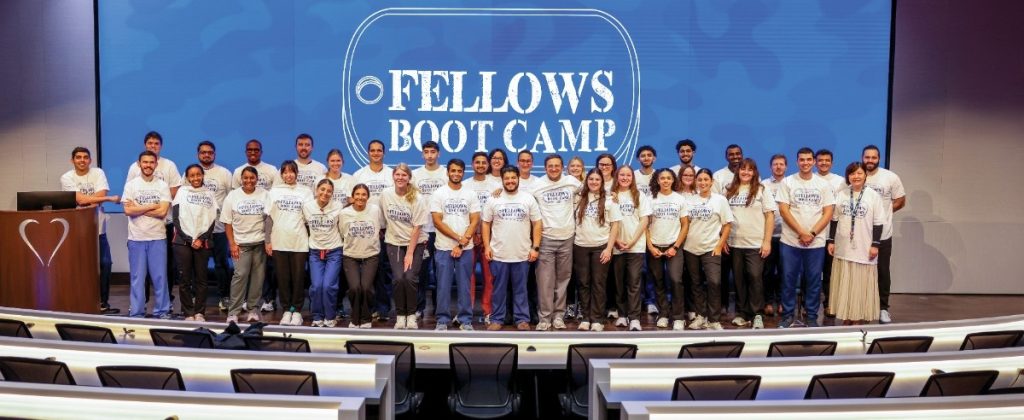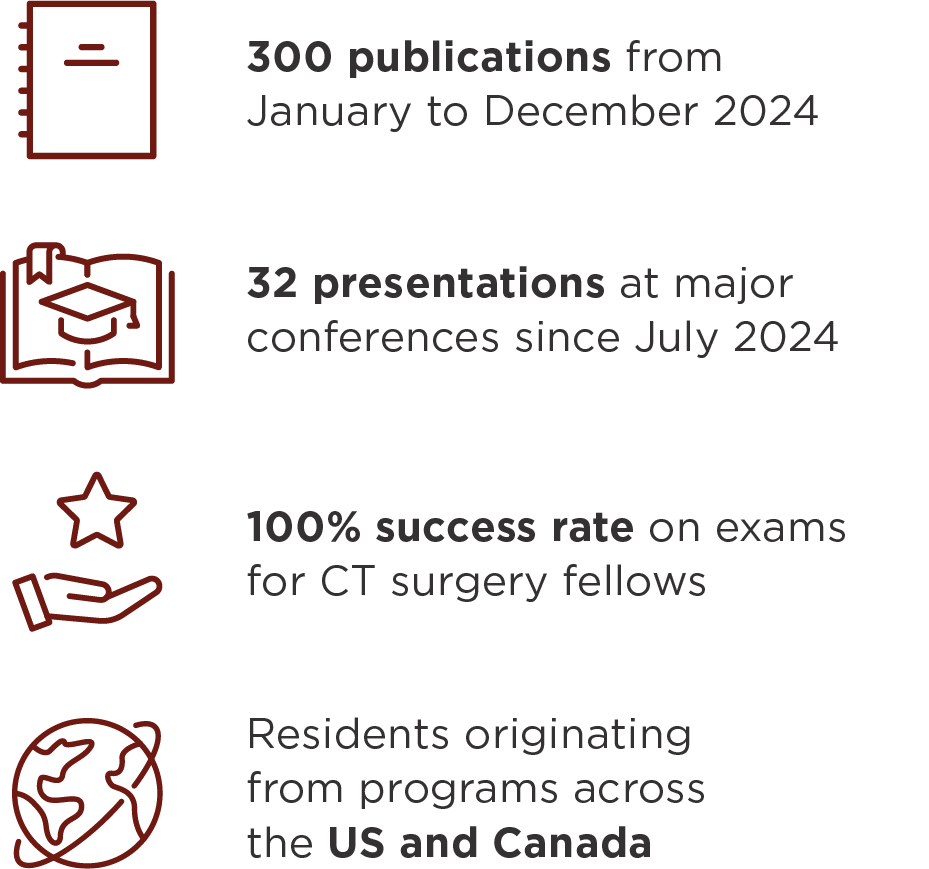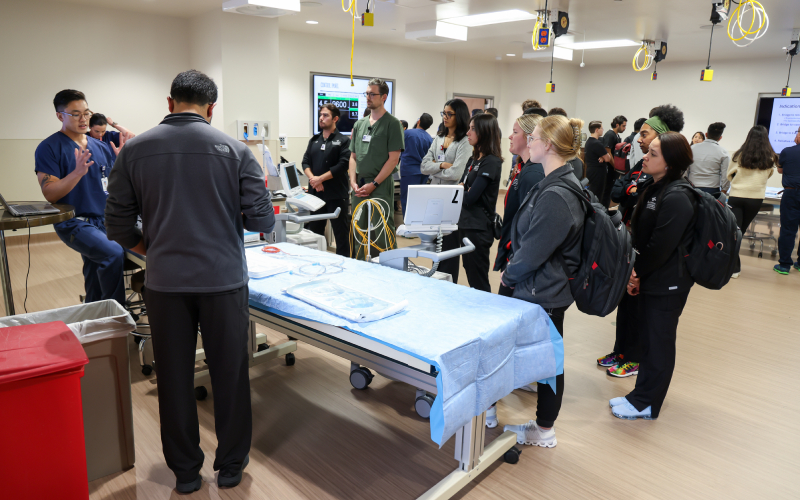Graduate Medical Education
Our graduate medical education program helps shape the next generation of healthcare professionals.
A tradition of excellence

The graduate medical education (GME) program proudly maintains its nine established programs, continuing a legacy of comprehensive training.
Accreditation Council for Graduate Medical Education-accredited fellowships include:
- Advanced heart failure and transplant
- Cardiovascular disease
- Clinical cardiac electrophysiology
- Interventional cardiology
- Thoracic surgery
- Vascular surgery
Texas Medical Board-accredited fellowships include:
- Advanced cardiac imaging
- Peripheral endovascular
- Structural heart
Global research collaboration
One of the program’s most distinctive advantages lies in its approach to national and international conference participation. All fellows have the opportunity to attend one conference per year at which they are not presenting.
Five fellows attended the TCT® Plus Middle East conference in April 2025: Ahmed Kazem, DO, Abdallah Assaf, MD, Asim Mohiuddin, MD, Malik Muhammad, MD, and Mohammed Salih, MD.
Additionally, a significant number of fellows presented at the TCT conference in the U.S.

Highly specialized training
A cornerstone of the GME experience is the intensive three-day Cardiovascular Fellows’ Boot Camp. This program offers cardiology fellows, as well as cardiothoracic and vascular surgery residents, an in-depth exploration of cardiovascular diseases and technologies, including preventive medicine, emergency care and the latest advancements in imaging and interventional cardiology.
The program emphasizes a collaborative “heart team” approach, fostering strong interspecialty relationships. This ensures that fellows gain comfort working with subspecialty surgeons and experience a non-siloed program, promoting a holistic understanding of patient care
The program emphasizes a collaborative “heart team” approach, fostering strong interspecialty relationships. This ensures that fellows gain comfort working with subspecialty surgeons and experience a non-siloed program, promoting a holistic understanding of patient care.
2024-2025 fellows and their residency program locations
Surgical fellows—General surgery residencies
Franklin Farid
University of Central Florida/HCA Healthcare, Kissimmee, Florida
William Hopper
University of Texas Health Science Center San Antonio Joe and Teresa Lozano Long School of Medicine, San Antonio, Texas
John Kanitra
Ascension St. John Hospital, Detroit, Michigan
Garrett Klutts
University of Arkansas for Medical Sciences College of Medicine, Little Rock, Arkansas
Nicholas Piening
University of Illinois College of Medicine at Peoria, Peoria, Illinois
Anne Rhudy
LSU Health New Orleans, New Orleans, Louisiana
Emily Shih
Baylor University Medical Center, Dallas, Texas
Jack Squiers
Baylor University Medical Center, Dallas, Texas
Jessica Suchanek
UM Health–Sparrow Hospital, Lansing, Michigan
General cardiology fellows—Internal medicine residencies
Ashkan Ahmadian
University of Texas Health Science Center San Antonio Joe and Teresa Lozano Long School of Medicine, San Antonio, Texas
Mica Alex
University of Texas Medical Branch Hospitals, Galveston, Texas
Modar Alom
Detroit Medical Center/Wayne State University, Detroit, Michigan
Abdallah Assaf
University of Tennessee Graduate School of Medicine, Knoxville, Tennessee
Samuel Dugger
Baylor College of Medicine, Houston, Texas
Ahmed Kazem
Henry Ford Health/Henry Ford Hospital, Detroit, Michigan
Kasim Malik
Loyola University Medical Center, Maywood, Illinois
Asim Mohiudin
Baylor University Medical Center, Dallas, Texas
Brandilyn Monene
Baylor College of Medicine, Houston, Texas
Adegbola Oluwole
Albert Einstein Medical Center, Philadelphia, Pennsylvania
Priyamvada Pillai
NewYork-Presbyterian/Queens, Flushing, New York
Michael Vu
Methodist Health System Dallas, Dallas, Texas
Cardiology sub-specialty fellows—General cardiology fellowships
Abdallah Abdelkader
King Faisal Specialist Hospital & Research Centre Riyadh, Riyadh, Saudi Arabia
Alexander Cubberley
Baylor Scott & White The Heart Hospital – Plano, Plano, Texas
Marika Harada
Baylor Scott & White The Heart Hospital – Plano, Plano, Texas
Amr Mrawan
Virginia Commonwealth University Health System, Richmond, Virginia
Mohammed Salih
Baylor Scott & White The Heart Hospital – Plano, Plano, Texas
Usman Sarwar
University of South Alabama Health Program, Mobile, Alabama
Rahul Sawhney
Baylor Scott & White The Heart Hospital – Plano, Plano, Texas
Owais Ulhaq
Baylor College of Medicine, Houston, Texas
Explore our research initiatives
Driving the field of cardiovascular care forward
Previous
Next



